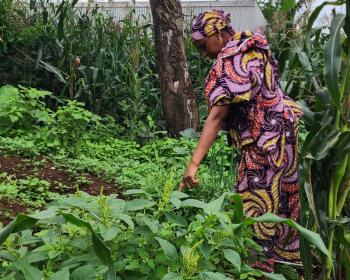
By Onambani Jules, Radio Director
In the lush, forested region of southern Cameroon, the Indigenous Bagyeli and Bakola communities, with a combined population of around 2,500, face growing threats to their ancestral lands and traditional way of life. Scattered across the Ocean department, these communities have long relied on the forest for their livelihoods and cultural identity. However, the encroachment of agribusiness, logging, and development projects has led to widespread deforestation and land grabbing, jeopardizing their existence.
Amidst these challenges, a powerful voice has emerged from the forest: Radio Nkuli Makeli. Established in 2016 with support from the Canadian High Commission in Cameroon, Cameroon Oil Transportation, and the Foundation for Environment and Development in Cameroon, this community radio station serves as a vital platform for the Bagyeli and Bakola Peoples to assert their rights, share their stories, and connect with the broader world.
Broadcasting in both Bagyeli and Bakola, Radio Nkuli Makeli is staffed by a dedicated team of Indigenous people and Bantu volunteers. Its programs focus on a range of critical issues including land rights, environmental protection, access to education and healthcare, and the preservation of traditional culture. The radio station has become an essential source of information and empowerment for these marginalized communities, who often lack access to mainstream media and government services.
In 2023, Radio Nkuli Makeli received a crucial grant from Cultural Survival’s Indigenous Community Media Fund, enabling the radio station to strengthen its technical capacity, train staff in radio production and digital media skills, and expand its outreach through a Facebook page. The grant also supported the creation of radio programs specifically focused on land rights and natural resource management.
One of the project's key achievements was the production of a radio program highlighting the critical role of women in land management. Traditionally, Bagyeli and Bakola women have been excluded from decision-making processes related to land use. The program emphasized the importance of their knowledge and participation in ensuring sustainable land management practices, while other programs focused on legal frameworks for land ownership, procedures for resolving land disputes, and strategies for advocating for Indigenous land rights.
The impact of Radio Nkuli Makeli and the Cultural Survival project has been profound. The radio station has increased awareness of Indigenous rights among the Bagyeli and Bakola communities and fostered a sense of collective identity and empowerment. Community members have gained valuable media production and advocacy skills, enabling them to communicate their concerns and participate in local decision-making processes effectively.
"Before, radio and social networks [did not exist] for us," said Manzoul Anne (Bagyeli) from Nkouli Zouli. "Now, it's different. I can gather information, cross-check it, and publish it. I know what to do and where to go if my land rights are infringed."
The success of Radio Nkuli Makeli demonstrates the transformative power of community media in amplifying marginalized voices and promoting social justice. By providing a platform for the Bagyeli and Bakola Peoples to share their stories and advocate for their rights, the radio station is playing a vital role in ensuring their cultural survival and self-determination. As they face increasing pressure on their lands and resources, Radio Nkuli Makeli stands as a beacon of hope and resilience, reminding the world that their voices will not be silenced.
In 2024, Radio Nkuli Makeli received a grant from Cultural Survival’s Indigenous Community Fund, which provides opportunities for international Indigenous radio stations to strengthen their infrastructure and broadcast systems and creates training opportunities for journalism, broadcasting, audio editing, technical skills, and more for radio journalists from Indigenous communities around the world. In 2024, the Indigenous Community Media Fund supported communities with 60 grants totaling $450,000 to Indigenous community media in 20 countries, supporting 87 Indigenous Peoples.
TOP IMAGE:Natural resource governance training


